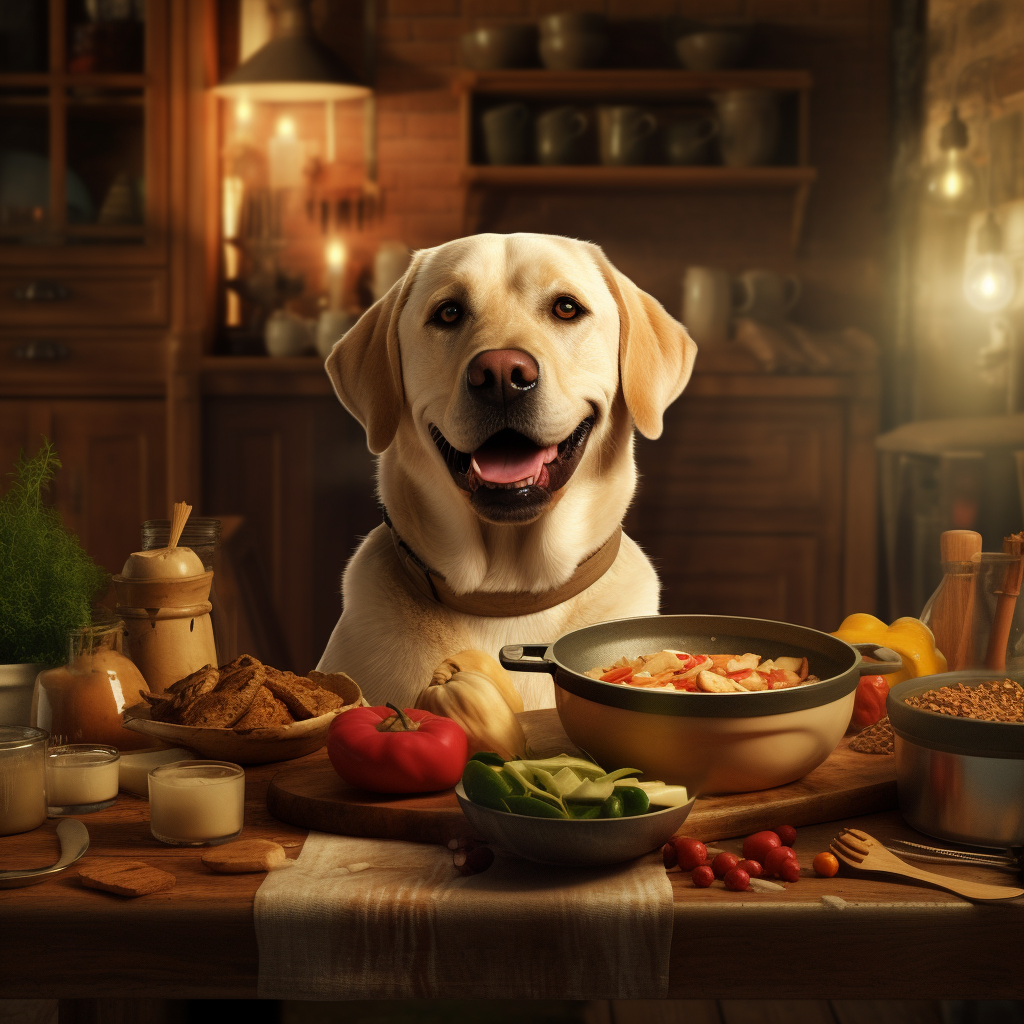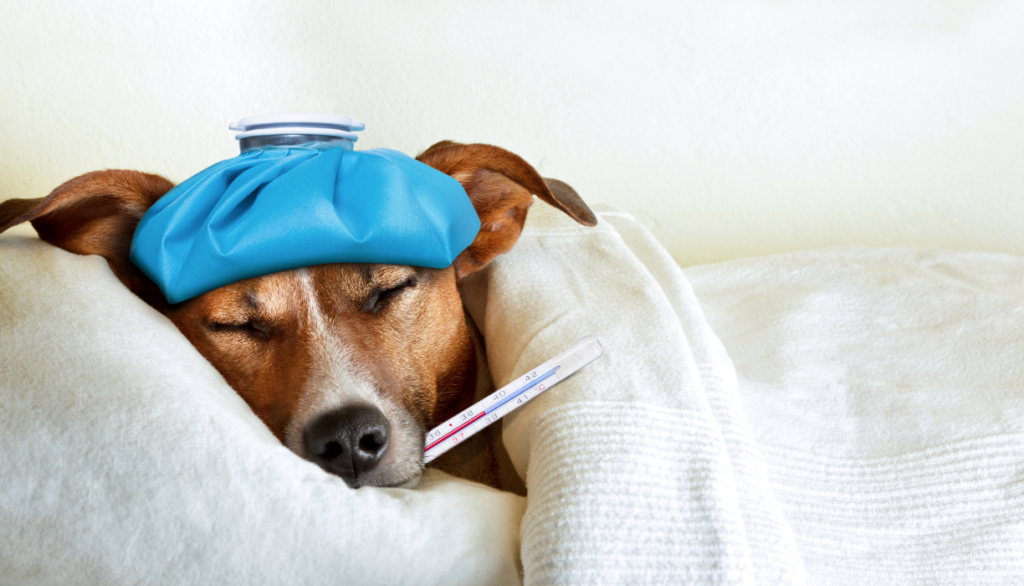5 Best Foods for wound healing for your dog
If your dog has a wound, a balanced and nutrient-rich diet can support the healing process. A study published in the Journal of Veterinary Medical Science found that a high-quality, nutrient-dense diet improved wound healing and reduced the risk of complications in dogs.

Importance of Nutrients for Best Wound Healing
Protein is essential for tissue repair and growth, while healthy fats provide energy and aid in the absorption of fat-soluble vitamins. Essential vitamins and minerals, such as vitamin C and zinc, play important roles in collagen synthesis and immune function, which are essential for wound healing. Additionally, omega-3 fatty acids have been shown to reduce inflammation and promote tissue repair. A study published in the Journal of Animal Science found that supplementation with omega-3 fatty acids improved wound healing in dogs.
Healing Foods for Dogs
Feeding your dog a healthy and balanced diet can have numerous benefits for their overall health and well-being, including helping to support their immune system and aiding in the healing process after injury or illness.
Some examples of these healing foods include:

1. Lean Proteins
Foods like chicken, turkey, and beef are great sources of protein, which is essential for tissue repair and growth.Protein contains amino acids, which are the building blocks of cells, tissues, and organs in the body. When a dog suffers from a wound or injury, protein is required to help rebuild and repair the damaged tissues. Additionally, protein is necessary for maintaining a healthy immune system, as it helps produce antibodies that can fight off infections and disease.
Top-notch lean protein choices for dogs:
Full Moon USDA Organic Chicken Jerky Healthy All Natural Dog Treats are not only delicious but also provide essential lean protein for your furry companion’s wound healing journey. Made with USDA organic chicken, these all-natural treats deliver the nourishment your dog needs to support the recovery process. Their high-quality ingredients and human-grade standards ensure that you are giving your dog the best care possible.
Indulge your precious pup with Castor & Pollux ORGANIX Organic Chicken & Oatmeal Recipe, a delicious meal that not only satisfies their taste buds but also supports their healing journey. Packed with wholesome, lean organic chicken and nourishing oatmeal, this recipe provides the perfect balance of nutrients for your furry friend’s wound healing process. With every wag of their tail, they’ll be getting the goodness of organic ingredients, helping them heal with love and flavor.
Please note that this post contains affiliate links. For more information and a disclaimer, please refer to the end of this article.
Give your furry companion the gift of wholesome healing with Castor & Pollux ORGANIX Organic Chicken & Oatmeal Recipe
2. Omega-3 Fatty Acids
Foods like salmon, sardines, and flaxseed oil are high in omega-3 fatty acids, which have anti-inflammatory properties and can aid in wound healing.including in areas of wounds. Additionally, these fatty acids can promote tissue repair and regeneration, which makes them helpful in aiding wound healing.
Zesty Paws Omega-3 Alaskan Fish Oil Chew Treats for Dogs offer a delicious and convenient way to provide your furry friend with essential Omega-3 fatty acids derived from Alaskan fish oil, these treats help reduce inflammation, support the immune system, and aid in tissue repair. Give your furry companion the natural support they need to heal and thrive with Zesty Paws Omega-3 Chew Treats.
3. Vitamin C
Incorporating foods rich in vitamin C, such as bell peppers, strawberries, citrus fruits, and broccoli, into a dog’s diet can provide a boost to their immune system, aiding in the healing process. Vitamin C is also crucial for collagen synthesis, promoting wound closure and the formation of healthy scar tissue, contributing to effective wound healing.
4. Zinc
Zinc is an essential mineral that supports dog wound healing by aiding in the production of new cells and tissues. It plays a vital role in the synthesis of collagen, an essential protein that provides structure to the skin and promotes proper wound closure. Foods like pumpkin seeds, beef, and lentils are good sources of zinc, which plays a critical role in wound healing by promoting cell growth and tissue repair.
5. Bone Broth
Homemade bone broth is a nutrient-dense food that can aid in wound healing by providing easily digestible protein, collagen, and minerals. Furthermore, bone broth is rich in amino acids like glycine and proline, which play crucial roles in tissue repair and collagen synthesis, further supporting the healing process of dog wounds. Additionally, the gelatin present in bone broth can help soothe the digestive system, making it easier for dogs to absorb essential nutrients and support overall healing.
No time to prepare bone broth at home? Check out these top-notch choices from trusted brands:
Brutus Bone Broth offers a premium selection of organic, slow-simmered bone broth for dogs, crafted from human-grade ingredients and offering a delightful array of flavors to cater to your furry companion’s preferences.
Primalvore Grass-Fed Beef Bone Broth
Brutus Bone Broth offers a premium selection of organic, slow-simmered bone broth for dogs, crafted from human-grade ingredients and offering a delightful array of flavors to cater to your furry companion’s preferences.
Foods to Avoid During Wound Healing for Dogs

A Guide for Responsible Dog Owners
Chocolate: The Hidden Danger
Chocolate, a beloved treat for us humans, contains theobromine, which is toxic to dogs. It can hinder wound healing and negatively affect their overall health. So, resist the temptation to share that chocolate bar with your pup, and keep all chocolate products safely out of their reach.
According to a study conducted by VCA Hospital, the amount of chocolate that can cause toxicity in dogs varies based on the type of chocolate and the dog’s weight. In general, mild symptoms may be observed in dogs ingesting 20 mg/kg, while cardiotoxic effects may manifest at 40-50 mg/kg, and seizures may occur at dosages equal to or exceeding 60 mg/kg^1. For more information, you can refer to the study here: chocolate poisoning in dogs.
Grapes and Raisins: A Hidden Threat
Grapes and raisins may seem harmless, but they can be toxic to dogs and potentially cause kidney damage. As a responsible dog owner, it’s crucial to keep these fruits out of your dog’s reach and avoid any complications that not only may hinder the healing process but can seriously harm your pet.
According to a study published by Tuft University, the ingestion of grapes or raisins is documented to cause acute kidney injury (AKI) in dogs. This highlights the severity of the situation and emphasizes the need for utmost caution.
By being vigilant and ensuring that grapes and raisins are inaccessible to your dog, you can protect their well-being and significantly reduce the risk of kidney damage. Remember, the potential outcomes of ingestion can be severe, so it’s essential to prioritize your pet’s safety by keeping these fruits securely stored away.
Watch Out for Fatty Foods
High-fat foods can contribute to inflammation and may delay the wound healing process. To ensure a smooth and speedy recovery, it’s advisable to avoid fatty foods and focus on providing a balanced diet that supports your dog’s healing journey.
Remember, every dog is unique, and their specific dietary needs during the wound-healing process may vary. Consulting with your veterinarian is always recommended to receive personalized advice tailored to your dog’s needs.
Spice It Down: Avoid Spicy and Seasoned Foods
While we may enjoy a bit of spice in our meals, it’s important to remember that spicy or heavily seasoned foods can cause digestive issues in dogs. These can disrupt their healing process and hinder nutrient absorption. Stick to a plain and gentle diet during this crucial time.
Alcohol: A Big No-No
While it may seem obvious, it’s essential to emphasize that alcohol is harmful to dogs. It can impair the healing process and lead to a range of health issues. So, make sure to prevent any accidental exposure to alcohol and keep it well away from your furry friend.
Onions and Garlic: Sneaky Culprits
Onions and Garlic: Sneaky Culprits These flavorful ingredients may be a staple in our kitchens, but they should never be a part of your dog’s meal. Onions and garlic, in any form (raw, cooked, or powdered), contain compounds called thiosulphates, such as N-propyl disulphide and N-methyl disulphide, which are toxic to dogs. The presence of these compounds can lead to oxidative damage, not only hindering wound healing but also negatively impacting the overall health of dogs. Therefore, it’s crucial to avoid feeding onions and garlic in any form to ensure a safe and successful healing process for your furry friend.
If you would like to learn more about this topic, you can refer to this article in the Merck Veterinary Manual which explains that garlic and other members of the allium family, including onions, contain thiosulfate, which is toxic to dogs but not to humans. Thiosulfate causes oxidative damage to red blood cells, resulting in hemolytic anemia
Optimizing Your Dog's Diet for Wound Healing: Guidelines and Considerations
Remember, every dog is unique, and their specific dietary needs during the wound-healing process may vary. Consulting with your veterinarian is always recommended to receive personalized advice tailored to your dog’s needs.
Note: The information provided is based on general knowledge and should not replace professional veterinary advice. For specific dietary recommendations, please consult with your veterinarian.
This comprehensive guide serves as a useful resource for dog owners and puppy lovers, highlighting the foods to avoid during the wound healing process. By adhering to these guidelines, you can ensure that your four-legged companion receives the best care and support for their recovery, enabling your dog to be in their best health during the healing process. This will provide their body with the optimal conditions to effectively navigate the journey of wound healing.
Note: The content provided is for informational purposes only and does not substitute veterinary advice. Please consult with a qualified veterinarian for specific dietary recommendations tailored to your dog’s needs.
Sources:
- ASPCA (American Society for the Prevention of Cruelty to Animals)
- VCA Hospitals: “Chocolate Poisoning in Dogs.”
- Tuft University “Grape Toxicity”
- www.petpoisonhelpline.com.
Disclaimer: It’s important to note that some of these recommendations may contain affiliate links, which means that I could earn a small commission if you make a purchase through those links. Please know that this doesn’t affect the price you pay and my primary goal is to provide you with helpful and unbiased information. Your support through these affiliate links is greatly appreciated and enables me to continue offering valuable content for dog lovers like you. Thank you for being a part of our community!




